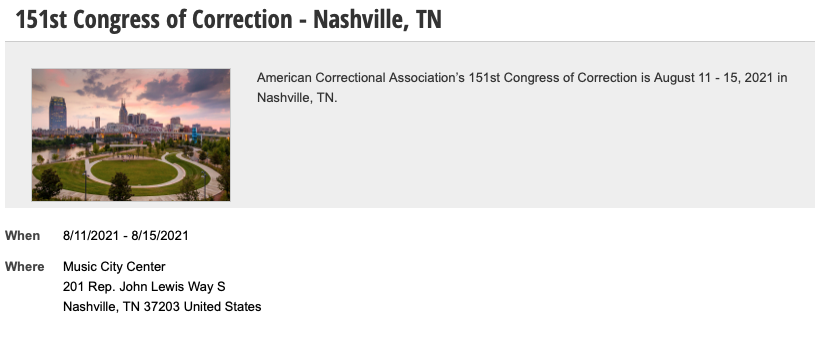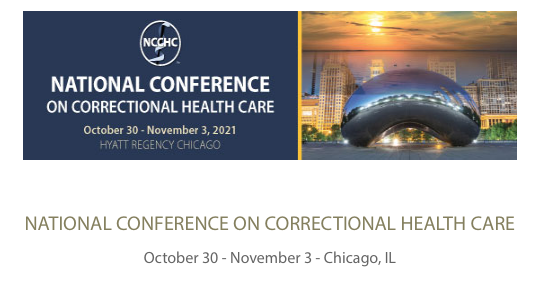
We’ve compiled top highlights from recent news, research, and resources across the world for our latest IACFP International News summary. Our topics for May/June include recent features on prison reform and pandemic response, new research, and upcoming conferences.
1. International News
- “Global Prison Trends 2021” Report Available
“Global Prison Trends 2021” was recently co-published by Prison Reform International and the Thailand Institute of Justice. The special focus for this issue is how authorities respond to different crisis situations, how prisons and the people within them are affected, and considerations for what measures authorities can put in place for better crisis preparedness and response. The report is easy to read with excellent information on policy, practices, and the people who work in prisons, as well as the people who are confined in them. The “Key Facts and Figures” graphics are impressive and provide a global perspective on the impact of the current pandemic.
There are 18 key messages in the report. IACFP members will be interested in all of them; however, one that is particularly important is COVID-19 measures in prisons have had a devastating effect on mental health. The report states, “The pre-pandemic mental health crisis in many prisons globally has reached grave new levels due to COVID-19 restrictions, and the suspension or downgrading of mental healthcare provisions. Data shows that self-harm and suicide rates have risen among some prison populations.”
The report states that “the inevitability of future crises, including conflict, natural disaster and health emergencies, and the resultant impact on prisons, requires enhanced contingency measures to be developed in all countries. The onset of COVID-19 demonstrated that no facility is immune from crisis and that even well-functioning prison systems can take steps to improve their crisis preparedness and prioritise human rights protections within those plans.” Both operational and reform plans should incorporate this into their work moving forward. The last year has shown that crisis/emergency preparedness is critical, not only as an immediate response but also for an extended response.
- “A Second Look at Injustice” The Sentencing Project recently published “A Second Look at Injustice” by Nazgol Ghandnoosh. The report presents in-depth accounts of three reform efforts that can be models:
- California’s 2018 law (Assembly Bill 2942) allows district attorneys to initiate resentencings.
Elected prosecutors across the state have begun using the law to undo excessively long sentences. Los Angeles County District Attorney George Gascón announced a sentence review unit for all who have served over 15 years. Lawmakers have also advanced legislation to enable all who have served at least 15 years to directly petition for resentencing. California’s experience demonstrates the potential of reaching a bipartisan consensus among prosecutors on the principle that some are serving unjust prison sentences. California also underscores the need for dedicating resources and educating the courts to achieve broad application of sentence modifications. - Washington, DC’s Second Look Amendment Act (2020) allows those who committed crimes as emerging adults—under age 25—to petition for resentencing after 15 years of imprisonment.
Supported by a coalition of advocates and local leaders, the law builds on an earlier reform for youth crimes and makes up to 29% of people imprisoned with DC convictions eventually eligible for resentencing. Local media coverage of the success of those resentenced for youth crimes helped generate broad public support to overcome opposition from the U.S. Attorney’s Office. DC Attorney General Karl Racine, Council Judiciary Chair Charles Allen, and Corrections Director Quincy Booth have recommended expanding the reform to all who have served over 10 years in prison. - New York State’s Elder Parole bill would allow people aged 55 and older who have served 15 or more years in prison to receive a parole hearing.
This ongoing campaign, led by Release Aging People in Prison and allies, became especially urgent amidst the state’s reluctance to use medical parole or commutations to release people at risk of COVID-19. Brooklyn District Attorney Eric Gonzalez supports the bill, explaining: “If someone has gone through the process of changing themselves … there should be a mechanism for them to then appear before a parole board that will fully vet them.”
- California’s 2018 law (Assembly Bill 2942) allows district attorneys to initiate resentencings.
While these reform efforts are presented as models for jurisdictions within the United States, they may have a more global application.
- EuroPris May 2021 Newsletter
The May 2021 Newsletter published by EuroPris has a particularly interesting interview with Phil Copple, Director General of Her Majesty’s Prison and Probation Service in England and Wales. He talks about how they responded to the pandemic, it’s impact on staff and prisoners, and how they learned from others—during the pandemic and currently. It reinforces the need for us to look at other systems around the world to learn from each other—both from efforts that do not achieve the desired results and those that are wildly successful.
- Vaccines for Prisoners
A recent WHO publication highlighted the need for equity in access to vaccines for both prisoners and staff who work in prisons.
“Even though good practice exists in many countries of the WHO European Region, the diversity of criteria adopted between and within countries puts equality of health protection at risk. It is essential to understand that loss of freedom should not lead to loss of health,” said Dr Nino Berdzuli, Director of the Division of Country Health Programmes at WHO/Europe.
A recent article in The Lancet came to the same conclusion. The authors stated that, “Custodial settings need to be included in global and national vaccinations plans and failing to do so will not only violate the UN Standard Minimum Rules for the Treatment of Prisoners, but also impede stopping transmission scenarios between prisons and the community.”
In the United States, these same positions are being taken. The National Commission on Correctional Health Care supported the American Medical Association in their position that prisoners and prison staff be given priority in their access to vaccination.
2. Research
- Criminal History and Adverse Childhood Experiences: Criminal Justice and Behavior, Vol. 48, No. 5, May 2021
“Criminal History and Adverse Childhood Experiences in Relation to Recidivism and Social Functioning in Multi-Problem Young Adults” was published in the May 2021 issue of Criminal Justice and Behavior. The authors are Laura Van Duin, Michiel De Vries Robbé, Reshmi Marhe, Floor Bevaart, Josjan Zijlmans, Marie-Jolette A. Luijks, Theo A. H. Doreleijers, and Arne Popma. This article summarizes the findings of information collected for 692 multi-problem young adults (18-27 years) in Rotterdam.
The goal of the study was to increase the knowledge of the predictive value of criminal history and ACEs (adverse childhood experiences) on the functioning of a young adult group with multiple problems in different domains of life. The purpose of the study was two-fold:
-
- “To explore what extent criminal history and ACEs predicted non-violent and violent recidivism for multi-problem young adults and
- To investigate the prediction of positive social functioning in terms of participation in education/employment and experienced QoL among multi-problem young adults.”
The results of the study are very interesting and have application for those engaged in program development and delivery. The findings did not indicate a relation between extensive criminal history and the presence of multiple ACEs; however, it did replicate the finding that criminal history predicts recidivism.
“Overall, the results from this study show that criminal history and ACEs have varied importance for social functioning of this multi-problem young adult group. While, in accordance to the literature, a more extensive criminal history demonstrated to be related to ongoing delinquent behavior even for this multi-problem group of young adults, multiple ACEs were only related to lower subjective well-being later in life. In addition, markers of criminal history were related to less educational and employment involvement.”
The study authors advise treatment programs for multi-problem young adults to “carefully take into account past criminal offending and ACEs to provide the best possible care and support that stimulates community reintegration and QoL improvement.”
- Criminological Highlights Vol. 19, Number 3, April 2021
The April 2021 issue of Criminological Highlights is available here. The issue addresses the following questions:
1. Does the public support the expunging of criminal records?
2. Is public support for increased police budgets associated with the presence of immigrants in a community?
3. Do high jail populations contribute to deaths in the community?
4. When imprisonment rates increase, is it safe to assume that sentencing practices have changed?
5. Can an intensive 1-day training program change police stop-and-search practices?
6. Does the diversion of low-risk offenders contribute to the safety and economic well-being of a community?
7. Should standardized ‘risk’ assessments of probationers allow overrides?
8. Why has youth crime decreased in the US?
Each question is addressed in a one-page summary of a published research article that is particularly useful for busy practitioners who want to be kept up to date on current issues.
3. Resources
- IAFMHS 2021 Virtual Conference, June 16-17, 2021
For more information, click here.
- Virtual Correction Mental Health Care Conference, July 20-21, 2021
For more information visit the NCCHC website or click here.
- 151st Congress of Correction, August 11-15, 2021
More information on the conference program and registration can be found here.
- ICPA Virtual Conference, October 26-28: Call for Papers
For more information visit www.icpa.org or click here.
- National Conference on Correctional Health Care, October 30-November 3, 2021
As more information is available on this conference, it will be posted at www.ncchc.org or click here.






